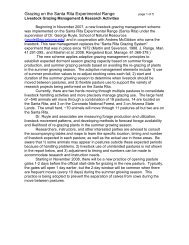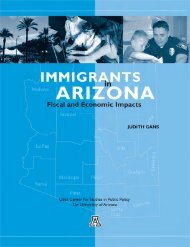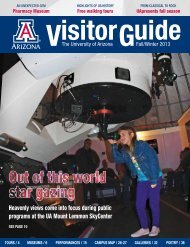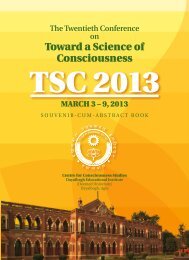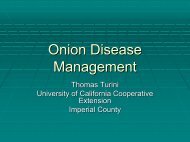CONSCIOUSNESS
Download - Center for Consciousness Studies - University of Arizona
Download - Center for Consciousness Studies - University of Arizona
- No tags were found...
You also want an ePaper? Increase the reach of your titles
YUMPU automatically turns print PDFs into web optimized ePapers that Google loves.
78 1. Philosophy<br />
76 Can Freely Voluntary Acts Appear Without Micro-Determinism? Weisiang Huang<br />
(Instit. of Philosophy of Mind, Taipei, Taiwan)<br />
In Libet’s study of ‘Unconscious cerebral initiative and the role of conscious will in voluntary<br />
action’ (1985), he presented that our conscious intention or decision which initiates the<br />
action happened after the start of the cerebral processes. It seems that the conscious intention<br />
does not really initiate an action; rather, an action is initiated by the cerebral process before<br />
our conscious intention. In another article ‘Do We Have Free Will?’ (2002), Libet tried to<br />
leave room for free won’t in the last 200 millisecond before the action. He introduced the conscious<br />
veto as a control function which appears without prior unconscious processes. I think<br />
this approach cannot really escape from determinism. Even there is a control function; we can<br />
accept either of the two possible situations about this function. First, this control function is<br />
still realized by a micro-mechanism which may further be initiated by other cerebral process.<br />
Second, this control function has no underling substrate. In the first way, it is impossible for<br />
free won’t to appear without prior unconscious processes, and it still falls into a deterministic<br />
approach. In the second way, the free won’t seems to be something non-physical, and it<br />
will turn into a dualistic approach. In my article, I try to accommodate these two conflicting<br />
possibilities in a biological approach. I will introduce the levels of organization in complex<br />
systems, and try to resolve the confliction on the surface of these two possibilities. In this<br />
approach, I will explain how can free will be possible but at the same time constituted by a<br />
physical substrate. P1<br />
77 Applying Dynamical Systems Theory to the Problem of Conscious Intentional<br />
Action Anthony Peressini (Marquette University,<br />
Milwaukee, WI)<br />
In this paper I consider the problem of conscious human agency and how one might make<br />
use of the insights of dynamical systems theory (DST) in neuroscience in a way that both (a)<br />
accords with its actual use in neuroscience, and (b) shows sensitivity to the traditional philosophical<br />
concerns about conscious human agency and the explanatory role of common sense<br />
(or “folk”) psychology (CSP). Philosophical uses of DST in conscious studies tend to embrace<br />
it more as metaphor than actual scientific theory. I consider one such account, Hanna’s and<br />
Maiese’s Embodied Minds in Action, and argue that DST isn’t at all integral to the account in<br />
that it merely incorporates loose ideas from DST into philosophical “business as usual.” Such<br />
philosophical applications make the natural (if obvious) use of the DST notion of emergence<br />
in that they associate emergent properties with CSP mental states like belief and desire, so<br />
that psychological explanations get the benefit of scientifically validated “downward causation,”<br />
though again, only metaphorically. On the other hand, neuroscientist Walter Freeman’s<br />
How Brains Make Up Their Minds, whose account of conscious agency is firmly and literally<br />
grounded in his pioneering work in dynamical modeling of the brain, leaves insufficiently<br />
addressed important philosophical questions like the causal efficacy of content and the status<br />
CSP explanation. His discussions of emergent meso-level properties, which are higher level<br />
than the neuronal but lower than conscious intentional states, come directly from groundbreaking<br />
work in neurodynamics. These meso-level properties are taken to be the emergent<br />
properties that explain behavior. Instead of the natural move of taking the emergent properties<br />
to be mental states (propositional attitudes), Freeman’s emergents are his meso-states, and<br />
these are the ultimate explanation of behavior. So while DST is integral via meso-emergence,<br />
it is an unnatural application of DST in that CSP explanations are excised from his account.<br />
This elimination of CSP’s propositional attitudes and their explanatory apparatus leaves important<br />
philosophical holes in our account of agency and causal/explanatory efficacy of CSP.<br />
I argue that the unnaturalness of the meso-level approach of Freeman can be mitigated in way<br />
that does address philosophical concerns with conscious agency and CSP explanation. I propose<br />
we understand CSP as constituting a set of constraints or boundary conditions intrinsic to<br />
the dynamical system of the brain/body. Construed in this way we see how and why CSP has<br />
the explanatory and predictive power it does with respect to the behavior, even if it does not<br />
(itself) actually model the underlying causal dynamics of the behavior. Additionally, viewing



